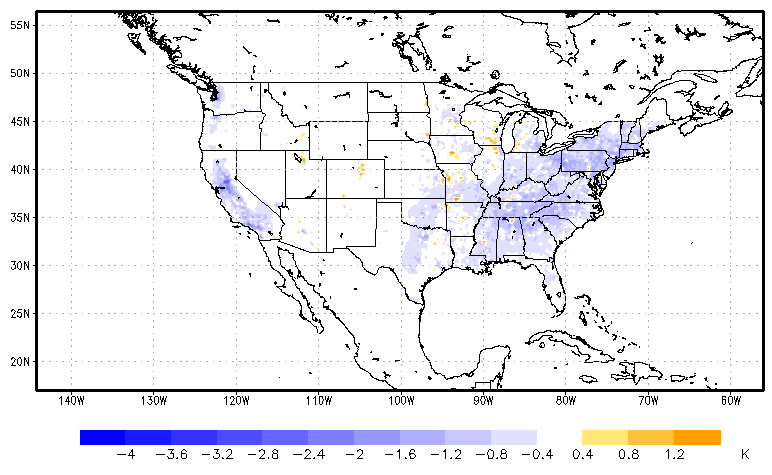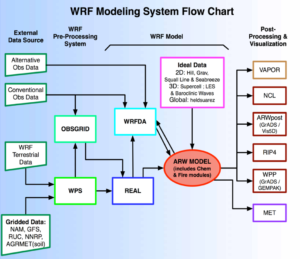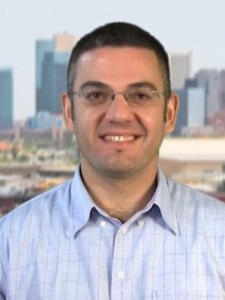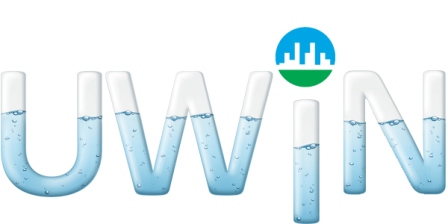Project A2-2: Land-atmosphere-hydrosphere interactions: Projecting future environmental change in urban areas
Matei Georgescu, PhD
Arizona State University
School of Geographical Sciences & Urban Planning
Heat waves are among the deadliest of natural phenomena, and their intensity, duration and frequency are projected to increase substantially over the 21st century due to greenhouse gas (GHG) induced climate change. Moreover, cities tend to be warmer than surrounding rural areas, and urban areas are projected to expand considerably in the coming decades.
This project investigates whether these two drivers of urban heat – climate change and urban development – dynamically interact to lessen or exacerbate projections of warming in cities. It also assesses the efficacy of various adaptation and mitigation strategies (e.g., cool and green roof implementations), and potential tradeoffs in terms of water use for irrigation. Finally, it examines impacts of climate change, urban development, and heat mitigation strategies on precipitation patterns.

Dynamically-downscaled 2090-2100 mean summertime change in near-surface air temperature due to projected urban development between 2000 and 2100 (A2 SRES scenario) and uniform cool roof application in 2100. Future climate scenario is RCP 8.5; warming due to greenhouse gas induced climate change not shown.
These objectives are achieved with decadal-scale regional climate modelling of the continental U.S., as well as high-resolution simulations of heat wave events for all UWIN regions. The Weather Research and Forecasting (WRF) model is applied for multiple scenarios at the beginning, middle and end of the 21st century, dynamically downscaling global climate model output for the latter periods. Urban expansion scenarios are derived from the EPA Integrated Climate and Land-Use Scenarios (ICLUS) data set.
U.S. Urban and Climate Change Assessment
We combine decadal-scale regional climate modeling simulations across the continental US (CONUS) with the Weather Research and Forecasting (WRF) system with urban expansion scenarios derived from the EPA Integrated Climate and Land-Use Scenarios (ICLUS) data set to examine end of century (2090-2099) hydroclimate impacts. Decadal scale simulation output is available for the CONUS at three-hour frequency, facilitating analysis across the diurnal cycle for end of century (2090-2099) relative to start of the century (2000-2009) climate.
Access Data Here!
Weather Research & Forecasting (WRF) Model
The WRF model from the National Center for Atmospheric Research is freely available and widely used. Learn more about WRF here: http://www2.mmm.ucar.edu/wrf/users/
The central outputs of the model inform the efficacy of simulated urban adaptation choices. Additionally, the current model application informs the following:
- The degree to which adaptation choices can successfully reduce targeted pressures
- Resilience of adaptation strategies in the context of changing external forces
- Potential co-benefits and unintended consequences that require quantification prior to prioritization of solutions.
Journal Articles
- Aliabadi, A.A., Krayenhoff, E.S., Nazarian, N. et al. Effects of Roof-Edge Roughness on Air Temperature and Pollutant Concentration in Urban Canyons Boundary-Layer Meteorology (2017) 164: 249. https://doi.org/10.1007/s10546-017-0246-1.
- Aragon, N. U., Stuhlmacher, M., Smith, J. P., Clinton, N., & Georgescu, M. (2019). Urban agriculture’s bounty: contributions to Phoenix’s sustainability goals. Environmental Research Letters, 14(10), 105001.
- Baniassadi, A., Sailor, D. J., Krayenhoff, E. S., Broadbent, A. M., & Georgescu, M. (2019). Passive survivability of buildings under changing urban climates across eight US cities. Environmental Research Letters, 14(7), 074028.
- Brandi, A., Broadbent, A. M., Krayenhoff, E. S., & Georgescu, M. (2021). Influence of projected climate change, urban development and heat adaptation strategies on end of twenty-first century urban boundary layers across the Conterminous US. Climate Dynamics, 1-17 DOI 1007/s00382-021-05740-w
- Benson-Lira, V., M. Georgescu, S. Kaplan, and E. Vivoni (2016), Loss of a Lake System in a Megacity: The impact of urban expansion on seasonal meteorology in Mexico City. Journal of Geophysical Research – Atmospheres 121(7), 3079-3099. http://doi.wiley.com/10.1002/2015JD024102.
- Broadbent, A. M., Coutts, A. M., Tapper, N. J., Demuzere, M., & Beringer, J. (2017), The microscale cooling effects of water sensitive urban design and irrigation in a suburban environment. Theoretical and Applied Climatology, 1-23. DOI 10.1007/s00704-017-2241-3
- Broadbent, A. M., Coutts, A. M., Nice, K. A., Demuzere, M., Krayenhoff, E. S., Tapper, N. J., & Wouters, H. (2019). The Air-temperature Response to Green/blue-infrastructure Evaluation Tool (TARGET v1. 0): an efficient and user-friendly model of city cooling. Geoscientific Model Development, 12(2), 785-803. https://doi.org/10.5194/gmd-12-785-2019
- Broadbent, A. M., Krayenhoff, E. S., Georgescu, M., & Sailor, D. J. (2019). The observed effects of utility-scale photovoltaics on near-surface air temperature and energy balance. Journal of Applied Meteorology and Climatology, (2019). https://doi.org/10.1175/JAMC-D-18-0271.1
- Broadbent, A. M., Krayenhoff, E. S., Georgescu, M., & Sailor, D. J. (2019). The observed effects of utility-scale photovoltaics on near-surface air temperature and energy balance. Journal of Applied Meteorology and Climatology, 58(5), 989-1006. https://doi.org/10.1175/JAMC-D-18-0271.1
- Broadbent, A. M., Krayenhoff, E. S., & Georgescu, M. (2020). Efficacy of cool roofs at reducing pedestrian-level air temperature during projected 21st century heatwaves in Atlanta, Detroit, and Phoenix (USA). Environmental Research Letters, doi: https://doi.org/10.1088/1748-9326/ab6a23
- Broadbent, A. M., Krayenhoff, E. S., & Georgescu, M. (2020). The motley drivers of heat and cold exposure in 21st century US cities. Proceedings of the National Academy of Sciences, 117(35), 21108-21117. https://doi.org/10.1073/pnas.2005492117
- Broadbent, A. M., Declet-Barreto, J., Krayenhoff, E. S., Harlan, S. L., & Georgescu, M. (2022). Targeted implementation of cool roofs for equitable urban adaptation to extreme heat. Science of the Total Environment, 811, 151326 https://doi.org/10.1016/j.scitotenv.2021.151326
- Cao, Q., D. Yu, M. Georgescu, J. Wu (2016), Impacts of urbanization on summer climate in China: An assessment with coupled land-atmospheric modeling, J. Geophys. Res. Atmos, doi: 10.1002/2016JD025210, 121(18), 10,505-10,521. http://onlinelibrary.wiley.com/doi/10.1002/2016JD025210/full
- Cao, Q., D. Yu, M. Georgescu, J. Wu, and W. Wang (2018), Impacts of future urban expansion on summer climate and heat-related human health in eastern China. Environment International, doi: https://doi.org/10.1016/j.envint.2017.12.027
- Cao, Q., D. Yu, M. Georgescu, and J. Wu (2018), Substantial impacts of landscape changes on summer climate with major regional differences: The case of China, Science of the Total Environment, https://doi.org/10.1016/j.scitotenv.2017.12.290
- Cao, Q., Liu, Y., Georgescu, M., & Wu, J. (2020). Impacts of landscape changes on local and regional climate: a systematic review. Landscape Ecology, 1-22. https://doi.org/10.1007/s10980-020-01015-7
- Clinton, N., M. F. Stuhlmacher, A. Miles, N. U. Aragon, M. Wagner, M. Georgescu, and P. Gong (2018), A Global Geospatial Ecosystem Services Estimate of Urban Agriculture, Earth’s Future, https://doi.org/10.1002/2017EF000536
- Georgescu, M., Broadbent, A. M., Wang, M., Krayenhoff, E. S., & Moustaoui, M. (2021). Precipitation response to climate change and urban development over the continental United States. Environmental Research Letters, 16(4), 044001 https://doi.org/10.1088/1748-9326/abd8ac
- Georgescu, M., Arabi, M., Chow, W. T., Mack, E., & Seto, K. C. (2021). Focus on sustainable cities: urban solutions toward desired outcomes. Environmental Research Letters, 16(12), 120201 https://doi.org/10.1088/1748-9326/ac37d1
- Georgescu, M., Broadbent, A. M., & Balling Jr, R. C. (2021). Effect of increased greenhouse gas concentration on mean, extreme, and timing of precipitation over Arizona (USA). International Journal of Climatology, 42(7), 3776-3792. https://doi.org/10.1002/joc.7444
- Goldblatt, R., M. F. Stuhlmacher, B. Tellman, N. Clinton, G. Hanson, M. Georgescu, C. Wang, F. Serrano-Candela, A. K. Khandelwal, W.-H. Cheng, and R. C. Balling, Jr. (2017), Using Landsat and Nighttime Lights to Map Urban Land Cover: A Novel Approach for Supervised Pixel-Based Image Classification. Remote Sensing of Environment. DOI: https://doi.org/10.1016/j.rse.2017.11.026
- Guyer, H., Georgescu, M., Hondula, D. M., Wardenaar, F., & Vanos, J. (2021). Identifying the need for locally-observed wet bulb globe temperature across outdoor athletic venues for current and future climates in a desert environment. Environmental Research Letters, 16(12), 124042 https://doi.org/10.1088/1748-9326/ac32fb
- Heusinger, J., Broadbent, A. M., Sailor, D. J., & Georgescu, M. (2020). Introduction, evaluation and application of an energy balance model for photovoltaic modules. Solar Energy, 195, 382-395. https://doi.org/10.1016/j.solener.2019.11.041
- Hondula, D.M., R.C. Balling, R. Andrade, E.S. Krayenhoff, A. Middel, A. Urban, M. Georgescu, and D. Sailor (2017), Biometeorology for Cities. International Journal of Biometeorology (Special Issue/By Invitation Only), 61(Suppl 1): 59-69, https://doi.org/10.1007/s00484-017-1412-3. Status = Published; Acknowledgement of Federal Support = Yes; Peer Reviewed = Yes.
- Hunt, J. C. R., Y. D. Aktas, A. Mahalov, M. Moustaoui, F. Salamanca, and M. Georgescu (2017), Climate change and growing megacities I: Hazards and vulnerability, Submitted to Proceedings of the Institution of Civil Engineers – Engineering Sustainability, doi: http://dx.doi.org/10.1680/jensu.16.00068
- Lachapelle, J. A., Krayenhoff, E. S., Middel, A., Meltzer, S., Broadbent, A. M., & Georgescu, M. (2022). A microscale three-dimensional model of urban outdoor thermal exposure (TUF-Pedestrian). International journal of biometeorology, 66(4), 833-848. https://doi.org/10.1007/s00484-022-02241-1
- Li, Mahalov, Hyde, Effects of urbanization on extreme rainfall in an arid/semiarid region. Royal Meteorological Society Atmos Sci Lett. 2020;21: e966. https://doi.org/10.1002/asl.966
- Krayenhoff, Scott E., M. Moustaoui, A.A. Broadbent, V. Gupta, M. Georgescu (2018), Diurnal Interaction between Urban Expansion, Climate Change and Adaptation in US Cities. Nature Climate Change 12 November 2018. https://doi.org/10.1038/s41558-018-0320-9
- Krayenhoff, E. S., Broadbent, A. M., Zhao, L., Georgescu, M., Middel, A., Voogt, J. A., … & Erell, E. (2021). Cooling hot cities: A systematic and critical review of the numerical modelling literature. Environmental Research Letters, 16 053007 https://doi.org/10.1088/1748-9326/abdcf1
- Stuhlmacher, M., Georgescu, M., Turner II, B. L., Goldblatt, R., Gupta, S., Frazier, A. E., … & Clinton, N. (2022). Are global cities homogenizing? An assessment of urban form and heat island implications. Cities, 126, 103705. https://doi.org/10.1016/j.cities.2022.103705
- Wang ZH, Fan C, Myint SW, Wang C (2016) Size matters: what are the characteristic source areas for urban planning strategies? PLoS One, 11(11):e0165726. http://dx.doi.org/10.1371/journal.pone.0165726
- Wang C, Wang ZH (2017), Projecting population growth as a dynamic measure of regional urban warming, Sustainable Cities and Society, 32: 357-365. https://doi.org/10.1016/j.scs.2017.04.010
- Wang ZH, Li Q (2017), Thermodynamic characterisation of urban nocturnal cooling, Heliyon, 3: e00290 https://doi.org//10.1016/j.heliyon.2017.e00290
- White, J.D.; Mack, E.A.; Harlan, S.L.; Krayenhoff, E.S.; Georgescu, M.; Redican, K. Regional Multivariate Indices of Water Use Potential for the Continental United States. Sustainability2019, 11, 2292. https://doi.org/10.3390/su11082292
- Yang, J., Z. Wang, M. Georgescu, F Chen, and M. Tewari (2016), Assessing the impact of enhanced hydrological processes on urban hydrometeorology with application to two cities in contrasting climates. Journal of Hydrometeorology 17, 1031-1047 (2016). http://journals.ametsoc.org/doi/abs/10.1175/JHM-D-15-0112.1
Updated: October 2021
Dissertations
Stuhlmacher, Michelle Faye (2020). Patch to Landscape and Back Again: Three Case Studies of Land System Architecture Change and Environmental Consequences from the Local to Global Scale. Arizona State University, PhD Dissertation. https://search.proquest.com/openview/69c9b29a622ade17e00fc5df03fbcd55/1?pq-origsite=gscholar&cbl=18750&diss=y
Uludere Aragon, N. Z. (2020). Underutilized spaces and marginal lands for sustainable land use: A multi-scale analysis (Order No. 27741997). PhD Dissertation. Arizona State University Retrieved: https://repository.asu.edu/items/56973
Updated: July 2020
Related Materials
 Matei Georgescu, PhD – Principal Investigator
Matei Georgescu, PhD – Principal Investigator
Associate Professor
School of Geographical Sciences & Urban Planning
Arizona State University
Voice: (480) 727-5986
Email: Matei.Georgescu@asu.edu
Dr. Georgescu’s research aims to improve understanding and characterization of distinct phenomena related to urbanization-induced landscape change. He focuses on identifying hydro-climatic and air quality impacts resulting from large-scale urbanization, as well as potential adaptation and mitigation strategies. In addition, Dr. Georgescu addresses environmental consequences (e.g., on climate and hydrology) of renewable energy expansion by integrating across physical, agricultural, and socioeconomic elements. The range of tools used to investigate these topics include climate models, remote sensing data and associated applications, and in situ weather/climate observations.
Mohamed Moustaoui, PhD
Associate Professor
Arizona State University
Email: mohamed.moustaoui@asu.edu
Scott Krayenhoff, PhD
Postdoctoral Research Scholar
Arizona State University
Email: scott.krayenhoff@asu.edu
